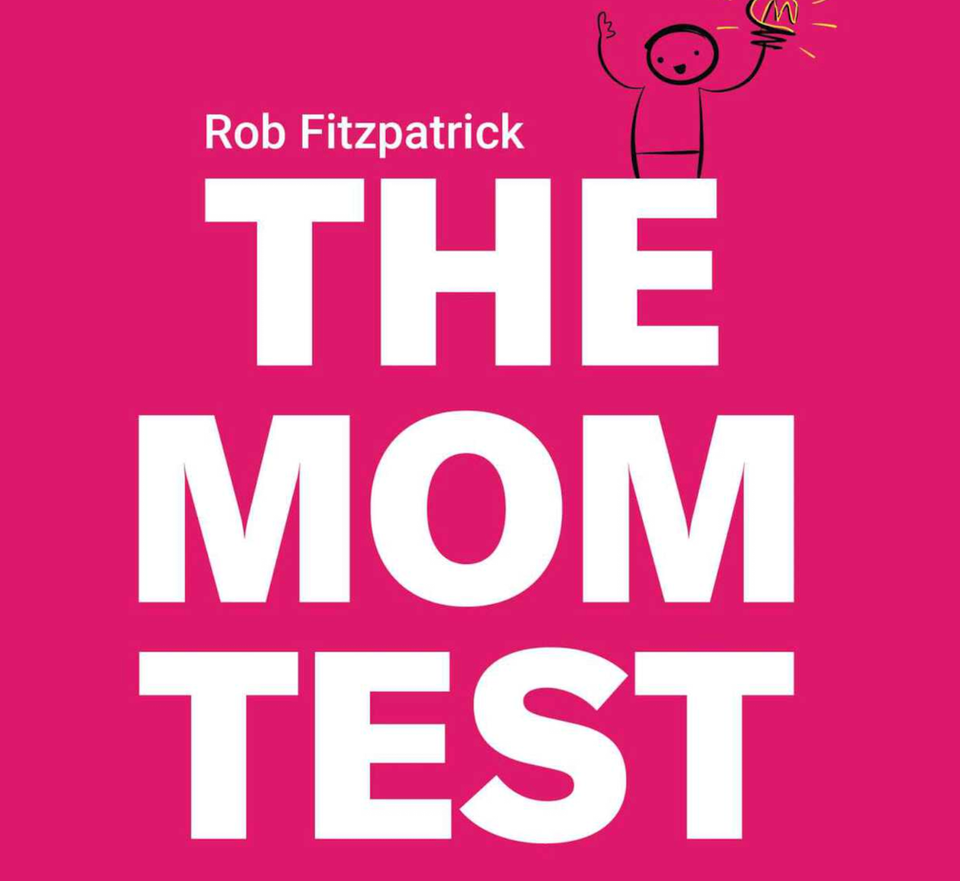The Mom Test

A good friend once told me the difference between a good book and a great book is timing. I couldn’t agree more.
Yesterday I started (and finished) a great little book called The Mom Test, a practical primer on how to talk to customers and get useful feedback.
Per usual, I took copious notes and highlighted standout phrases in every chapter— a few really stood out for this early season in Listener’s journey. The premise of this text is that most entrepreneurs are actually really bad at listening to customers. Because of founder bias, often we lead conversations exactly where we want them to go, rather than actually listening to customer problems. This guide helps founders avoid compliments, hypotheticals, and leading questions--so even your own mom can't lie to you about your idea.
While there was some sage advice that resonated with practices I have come to know through other startup experiences, there was also advice I really didn’t like but I know I needed to hear:
It’s easy to get someone emotional about a problem if you lead them there. “Don’t you hate when your shoelaces come untied while you’re carrying groceries?” “Yeah, that’s the worst!” And then I go off and design my special never-come-untied laces without realizing that if you actually cared, you would already be using a double-knot.
Rule of thumb: Some problems don’t actually matter.
- Rob Fitzpatrick. The Mom Test: How to talk to customers & learn if your business is a good idea when everyone is lying to you
In the margins I scribbled an honest reflection “Hate this. Many many people believe their mental health doesn’t matter.” While it seems as clear as day to me that humans are designed for connection and more disconnected than ever, I cannot prescribe a solution until I deeply listen and understand the problem, alternatives, and motivations that drive behavior.
In the earliest search phase of a pre-seed startup, the goal is not scale, but solving real customer problems. While I know that 61% of U.S. adults self report as lonely and that our present mental health crisis is ballooning demand for help beyond the supply of traditional methods, I do not yet know if this problem ‘actually matters’ enough for people to pay for a novel solution like listener.
If this had been 10 years ago, I almost certainly would have started a non-profit to rally like-minded donors and fundraise to tackle this crisis head on. While there is obviously an important role for non-profits (I spent 17 years leading in one), I am convinced that sustainable business is the primary way that I can co-create to make this world a better place. In future posts I will elaborate on this perspective shift and share some inspiration that permanently altered how I view the world.
Creating a sustainable startup to solve real problems requires intense discipline and discovery. Fueled by passion and a bias to action for helping, I'm reminded of the importance of actually listening. Instead of pitching, I am gently guiding conversations to uncover real pain points, workarounds, and motivations.
In my earliest rounds of listening, I've discovered a few key challenges people are facing in this arena:
- Therapy is too expensive and often outside the reach of those who need it most
- Wait times to get into a licensed professional can stretch to multiple months
- Onboarding and insurance forms are complex and create lots of friction
- Finding a counselor you really connect with can be very challenging and often the relationship feels too formal or 'clinical'
- Life transitions are difficult and there isn't really anyone available to 'process'
- Faith communities mean well, but often center around 'fixing' and giving advice
- Chatbots tell you what you want to hear and specialize in giving lists of unsolicited advice
I believe that everyone deserves to be heard. Real human connection through intentional listening can reverse the tide of the loneliness epidemic that is prematurely claiming too many lives.
I definitely do not have all the answers, but I'm learning to asking better questions that pass "The Mom Test."
If you would be willing to share 20 minutes of your own journey/struggle in finding a safe place to be heard, please reach out today. I would be honored to listen.
If you also believe real human connection has the power to heal and want to pledge your quiet support of this early journey, consider joining Listener Fellows.